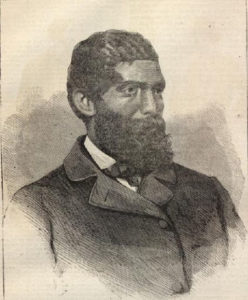
John S. Rock
*John Rock was born on this date in 1825. He was a Black lawyer, teacher, and abolitionist.
From Salem County, New Jersey, at an early age, John Stewart Rock had an insatiable appetite for learning. Although his parents were poor, they committed to sending young Rock to school. At eighteen, Rock began to teach at the all-black public elementary school in Salem, a position he held until 1848. As the school flourished under his leadership, Rock began studying medicine through the libraries and private teaching of white doctors Quinton Gibbon and Jacob Sharpe.
He eventually received an apprenticeship with a white physician but was prevented from attending medical college because of his race. Undaunted, Rock turned his attention to dentistry. Certified as a dentist in 1849, he moved to Philadelphia in 1850 and opened a private practice. He had been asked to speak in Philadelphia before the Twelfth Annual Meeting of the Pennsylvania Anti-Slavery Society. He had been inspired by the commitment of whites and Blacks to abolitionist principles. He began to publish articles in various Philadelphia newspapers.
By 1852, he was married to Philadelphia native Catherine Bowers and had received a medical degree from the American Medical College. In 1853, he and his wife moved to Boston. John Rock arrived in Boston with his stake already set in the Black community of Beacon Hill. While writing and lecturing in Philadelphia, he had become well known in Boston abolitionist circles as a man of racial militancy. In addition, upon opening his dental and medical practice at 83 Phillips Street, Rock became a member of the small yet powerful Black upper class, forming partnerships with contemporaries like Lewis Hayden, Joshua B. Smith, and Leonard Grimes. By the end of his first year in Boston, Rock had become a member of the Boston Vigilance Committee, for which he served as a doctor, administering free medical services to fugitive slaves.
In 1855, he served as one of Boston's representatives at the Colored National Convention. He sponsored the community dinner in honor of William C. Nell and the integration of Boston public schools. As a political lecturer and abolitionist speaker, Rock emphasized Black self-determination, the importance of education, and the inherent beauty of the African race and its cultures. In 1856, he petitioned the Massachusetts Board of Mayors and Aldermen to remove the word "colored" from all voter lists and tax bills. That same year, he gave a lecture before the Massachusetts Legislature entitled Unity of the Human Race. In this lecture, for which he received excellent reviews from local newspapers, Rock linked the struggle for Black freedom to a holy crusade for human salvation, stating, "Our course is of God and cannot be overthrown."
In 1857, at a dedication of a Masonic Temple in Philadelphia, Rock gave his most famous speech, "The Light and Shadows of Ancient and Modern Tribes of Africa," in which he stated, "Wherever the colored man is elevated, it will be by his own exertions." The following year, in 1858, at Boston's annual Crispus Attucks Celebration, Rock became the first Black activist to publicly acknowledge pride in himself and his race". In 1858, with ill health that area physicians could not remedy, John Rock traveled to Paris for medical treatment. It was a trip that incited controversy, for it occurred when the U.S. Secretary of State Lewis Cass had ruled that blacks could not receive passports because they did not possess United States citizenship status. With his white political colleague, Sen. Charles Sumner, Rock forced the Massachusetts legislature to pass a law granting the state the right to issue passports to Black citizens. With his passport, Rock was treated by some of the most renowned Parisian doctors, who informed him that his delicate health would prevent him from practicing medicine.
He returned to Boston in 1859 and closed his profitable dental and medical practice. He began studying law, however, and by 1861 (the year he passed the bar), he was commissioned by Governor John Andrew to become a justice of the peace for Boston. He also opened up his law practice at number 6 Tremont Street. Throughout the American Civil War, Rock practiced law, served as justice of the peace, and continued to work for Black equality with activists like Frederick Douglass and Lewis Hayden. Together, these activists petitioned the Massachusetts Legislature to form a Black military company and helped recruit Black soldiers for the 54th Massachusetts Regiment in 1863.
In 1865, however, John Rock became the first Black man to practice law before the U.S. Supreme Court. When the House of Representatives in D.C. received him, Rock became the first Black lawyer to be introduced at a session of Congress. It would be the last triumphant act in a life overflowing with achievement, for Rock died suddenly on December 3, 1866. He was interred at the Twelfth Baptist Church and buried with full Masonic honors at Woodlawn Cemetery in Everett, MA. Sources:
Buzby, J, Harlan.
"John S. Rock, D.S., M.D., Esq. 1825-1866
Teacher, Healer, Counselor" in Salem County History Society Newsletter March 1996 vol. XLI, issue I.
Horton, James and Lois Horton.
African American Bostonians: Family Life and Community Struggle in the Antebellum North.
New York: Holmes and Meier, 1999.
Jacobs, Donald M., ed.
Courage and Conscience: African American and White Abolitionists in Boston Indianapolis:
Indiana University Press, 1993.